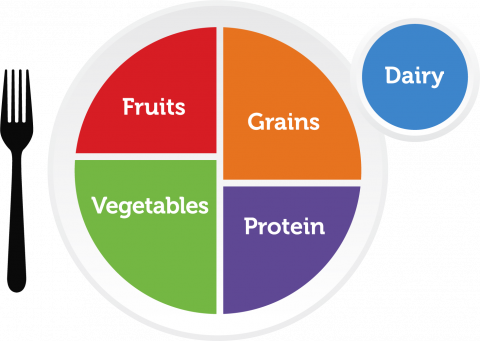
Nutrition is what you eat and how it affects your health, growth, and development. Eating the right types and amounts of food contributes to both everyday wellbeing and long-term health. Some benefits of a healthy diet include improved digestion, better immune function, a reduced risk of chronic diseases, stronger bones, positive mental health effects like increased confidence, increased energy levels, and assistance with maintaining a healthy weight.
People with Down syndrome can experience the same benefits from eating a healthy diet as people without Down syndrome and can follow the same dietary guidelines for general guidance. However, there are some clinical conditions that may affect nutritional status that people with Down syndrome are more likely to experience including an increased risk of obesity and certain gastrointestinal conditions, like celiac disease, that require dietary modifications. Some people with Down syndrome may have difficulties with food related sensory processing and oral motor skills, including chewing, drinking, and swallowing. These difficulties can have an impact on feeding and nutrition. It is important to consult a feeding specialist if your loved one is experiencing these difficulties.
Dietary Guidelines

The U.S. Department of Agriculture (USDA) and U.S. Department of Health and Human Services (HHS) established dietary guidelines based on the types and amounts of nutrients needed for optimal health. The MyPlate model was developed as a tool that makes it easy to remember the food groups and proportion of foods needed every day. MyPlate consists of five food groups: fruits, vegetables, grains, protein, and dairy. The MyPlate model serves as a visual reminder of how much of each food group to eat. The guidelines also encourage people to limit added sugar, salt, saturated fat, and alcohol. More specific guidelines for each age group can be found on the MyPlate website.
What does a healthy diet look like?
According to the USDA dietary guidelines:
Key foods to include in your diet are:
- A variety of different fruits and vegetables daily
- Whole grain products such as whole wheat bread, brown rice, and quinoa
- Low-fat dairy products such as low-fat yogurt and skim milk
- Lean proteins such as chicken, turkey, Greek yogurt, fish, beans, tofu, lentils, and lean meats
- Water for drinking
- Portion sizes adjusted to meet an individual’s needs based on their health and wellness goals.
Key to foods to limit in your diet are:
- Foods and beverages with added sugars such as sugar sweetened beverages (soda, fruit drinks, energy drinks, etc.)
- Foods high in sodium, trans fats, and saturated fats
- Alcoholic beverages
Dietary Considerations for people with Down Syndrome
Research suggests that the above basic principles of a healthy diet are also appropriate for individuals with Down syndrome. However, there are some unique dietary considerations for individuals with Down syndrome.
Food selectivity
Food selectivity and selective eating habits have been shown to be more common in children with Down syndrome. Selective food preferences can be influenced by a variety of factors including dual diagnosis of autism-spectrum disorder, difficulty swallowing, and oral-motor delays. Selective eating habits can look different from person to person and may include a diet limited to foods of specific colors or textures, a diet with fewer than 10-15 foods, or a diet consisting of foods from only 1 or 2 food groups. Introducing new foods gradually and without pressure can help add variety to your loved one’s diet and make trying new foods a more positive experience. It can often take more than 20 exposures for a child with a neurodevelopmental disability to become more willing to accept the new food. If your loved one is struggling with food selectivity, working with an interdisciplinary feeding therapy team may be helpful.
Obesity and overweight
Individuals with Down syndrome are at a higher risk of being overweight or obese compared to those without Down syndrome. Several factors may contribute to this increased risk including hormonal imbalances, sleep patterns, physical activity levels, hypothyroidism, mental health conditions, and medications. Maintaining a healthy weight can help improve management of other health issues worsened by obesity, including sleep apnea, arthritis, aspiration pneumonia, and reflux. Obesity can also impact quality of life for people with Down syndrome by affecting their ability to participate in the community, live independently, and maintain self-esteem. Key elements of a healthy diet that support maintaining a healthy weight include being mindful of portion sizes, limiting consumption of sugar-sweetened beverages, and including a variety of foods and vegetables. While a healthy diet is an important aspect of weight management, it is critical to consult with a healthcare provider or specialist to rule out other potential contributing factors to obesity.
Celiac disease
Individuals with Down syndrome have a higher prevalence of Celiac disease. Possible symptoms include difficulty gaining weight, diarrhea, vomiting, constipation, nutritional deficiencies, and general irritability or behavior changes. An initial diagnosis can be made through a simple blood test, but a definitive test requires a special procedure from a GI specialist. If your loved one has Celiac disease, it is important that they adhere to a gluten-free diet that is free of all barley, rye, and wheat. When implementing a gluten-free diet, it is important to prioritize intake of naturally gluten-free whole foods like fruits, vegetables, and high-fiber, gluten-free carb sources such as quinoa, brown rice, chickpeas, and lentils. Learn more on our Gastrointestinal System and Down Syndrome Page.
Lactose intolerance
People with Down syndrome may experience lactose intolerance. Symptoms may include abdominal pain, bloating, gas, and diarrhea or constipation. Lactose intolerance can be diagnosed through a hydrogen breath test, a blood test, or a stool acidity test. If your loved one is lactose intolerant, limit or avoid dairy products per individual tolerance. You can also ask a provider if digestive enzymes might be beneficial. If your loved one has a diet limited in dairy, it is important to include other food sources of calcium or fortified alternatives.
Constipation
Poor diet and lack of physical activity can contribute to constipation. Eating enough fiber and drinking enough water every day can help relieve constipation. High-fiber foods can include fruits and vegetables, legumes, and whole grains. If you are concerned your loved one with Down syndrome is not eating enough fiber, it may be beneficial to discuss with your doctor or registered dietitian if fiber supplementation is an appropriate option. Hypothyroidism, Hirschsprung’s disease, lactose intolerance, and Celiac disease can also lead to constipation. It is important to consult a healthcare provider or specialist if chronic constipation persists. Learn more on our Gastrointestinal System and Down Syndrome Page.
Gastroesophageal Reflux Disease (GERD)
GERD, better known as reflux, is common in people with Down syndrome. Common symptoms to look out for include heartburn, belching, nausea, regurgitation, and behavior issues or aggression. Certain foods can sometimes worsen reflux symptoms. Some of the foods that may worsen reflux include acidic foods like tomato and citrus, fried foods, processed meats, caffeinated beverages, and chocolate. You can help your loved one with Down syndrome manage their reflux by encouraging them to limit their consumption of foods that worsen their GERD symptoms and practice portion control at meal and snack times. Reflux is also commonly treated with medications, so it is important to follow up with a provider for more specific recommendations. Learn more here.
Possible differences in satiety
Some research suggests that people with Down syndrome may have increased leptin levels. Leptin is the hormone that signals to our brain that we are full. Because people with Down syndrome may have a more difficult time feeling full or satisfied, it can be helpful to prioritize hydration and consumption of foods that increase satiety such as those higher in protein and fiber. Practicing intuitive eating habits and being mindful of portion sizes can be beneficial to avoid overeating due to differences in satiety. A few ways to practice mindful eating include listening to your body’s hunger and fullness cues, sitting down for meals, eating slowly, chewing food thoroughly, and avoiding distractions at meal and snack times.
Diabetes
People with Down syndrome have a higher prevalence of type 1 diabetes than people without Down syndrome. People with Down syndrome may also be at higher risk for developing type 2 diabetes due to increased prevalence of risk factors such as higher rates of obesity. Nutrition plays a key role in the management of both type 1 and type 2 diabetes. If you or your loved one have concerns about nutrition and managing diabetes, it is important to consult a registered dietitian or certified diabetes educator.
Supporting Healthy Eating as a Caregiver
Children
Parents, family members, and caregivers play a key role in supporting healthy eating by determining the foods and drinks bought, prepared, and served. Exposing children to a variety of nutrient-rich foods helps develop healthy eating habits, especially as taste preferences are formed. Since children's diets often reflect those of their household, shared meals and role modeling of healthy eating habits can help establish long-term healthy habits. Parents and caregivers can also encourage healthy relationships with food from a young age by involving children in grocery shopping, meal preparation, and encouraging autonomy by offering healthy choices.
Adults
Caregivers can support their loved ones with Down syndrome with preparing and eating meals independently by teaching cooking skills and modeling healthy eating behaviors. Sharing meals with friends and family can also enhance food enjoyment and support proper dietary intake in adults. For individuals who have difficulty chewing or swallowing, trying new foods can help discover textures that are easier to manage and are more enjoyable. However, it's important to work with a healthcare team to ensure that any dietary changes are safe and appropriate. Additionally, maintaining good dental health is essential for overall well-being and the ability to thoroughly chew food. Learn more about dentistry and how to find a dentist on our Dentistry & Down Syndrome Page. Tailoring meal preparation to a person’s individual interests, skills, and cultural background can help make eating a healthy diet more enjoyable and sustainable. It is important to keep in mind that people with Down syndrome may have different priorities and reasons for wanting to eat a healthy diet compared to their parents and caregivers. Identifying motivating factors that are important to the person with Down syndrome can help encourage your loved one to make healthy eating choices.
NDSS 321go!®
NDSS 321go!® is a health and wellness program for people with Down syndrome and their loved ones with three key areas of focus: physical activity, balanced nutrition, and emotional wellness. The nutrition portion of the program is based on the MyPlate model and provides information about the types and amounts of foods that should be eaten from each group. Hydration, added sugar, and weight management strategies are also covered in a visual, easy-to-read format. Goals and challenges in the 321go! program celebrate trying new foods and taking small steps towards a healthier diet. The program highlights support strategies so that families can make these changes together. 321go! can be done at home or in a group setting. Individual program materials can be found here. Email NDSS if you would like to offer 321go! for a group at 321go!@ndss.org.
Thank you to Shannon Frizzell, Registered Dietitian, who provided updates to this webpage.
External Resources
- Nutrition and Diabetes | ADA
- Weight management recommendations for youth with Down syndrome: Expert recommendations | Frontiers
- GLOBAL Medical Care Guidelines for Adults with Down Syndrome | Global Down Syndrome Foundation
- General Dietary Recommendations for People with Down Syndrome | PMC
- Diabetes in Adults with Down Syndrome | Adult Down Syndrome Center
- Celiac Disease Foundation
- The Nutrition Source: Mindful Eating | Harvard T.H. Chan School of Public Health
- The MIND Diet | eatright.org Academy of Nutrition and Dietetics
- Dickie’s Cooking School
- Pica - The Basics for Caregivers







